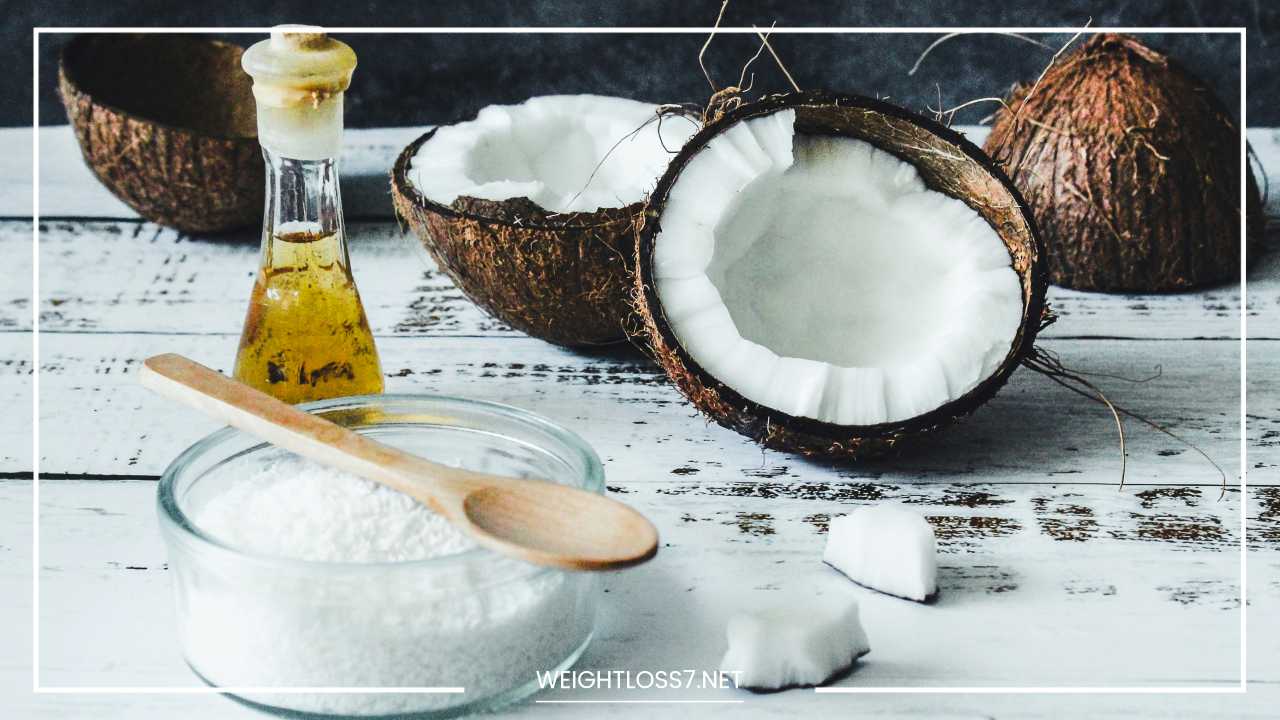Burn Fat and Lose Weight With Coconut Oil

Coconut Oil
Shedding the Coconut Shell: A Deep Dive into Coconut Oil and Weight Loss
Coconut oil. It seems to be everywhere these days, gracing supermarket shelves and health food stores alike. From glowing celebrity endorsements to countless online articles, the message is clear: coconut oil is a weight-loss wonder ingredient.
But before you ditch your olive oil and embrace the tropical aroma, let’s embark on a journey to uncover the truth behind this trendy fat.
This comprehensive blog post delves into the science of coconut oil and its potential role in weight management.
We’ll crack open the coconut shell of information, exploring the biochemistry of MCTs, addressing the limitations of research, and ultimately, providing a balanced perspective on how coconut oil can be incorporated into a healthy weight-loss strategy.
The Enchantment of Coconut Oil: A Look at MCTs
Coconut oil’s rise to fame can be attributed to its unique fatty acid profile. Unlike most vegetable oils laden with long-chain triglycerides (LCTs), coconut oil boasts a high concentration of medium-chain triglycerides (MCTs).
These are the key players that have captured the imagination of weight-loss enthusiasts. Here’s why MCTs sound so promising:
- Enhanced Satiety: Studies suggest MCTs may influence hormones involved in regulating appetite, potentially leading to feelings of fullness and reduced calorie intake [1]. This could be beneficial for managing cravings and preventing overeating.
- Metabolic Boost: MCTs take a different metabolic route compared to LCTs. They bypass the lymphatic system and travel directly to the liver, where they are readily converted into energy or ketones. This potentially leads to a slight increase in calorie burning through a process called thermogenesis [2].
- Reduced Fat Storage: There’s some evidence suggesting MCTs may be less likely to be stored as body fat and instead be used for immediate energy needs. This could be advantageous for weight management [3].
These characteristics paint a picture of a fat that curbs hunger, revs up metabolism, and discourages fat storage – a trifecta for weight loss! However, before we crown coconut oil the king of weight-loss solutions, let’s delve deeper.
Cracking the Coconut: Unveiling the Limitations
While the science behind MCTs is intriguing, the weight-loss benefits of coconut oil itself often get overhyped. Here’s a closer look at the realities:
- Modest Impact: Research shows that while coconut oil may lead to slightly more weight loss compared to other fats, the effect is often small and may not be sustainable in the long term [4]. Several factors, including calorie intake, exercise habits, and individual metabolism, can significantly influence weight loss outcomes.
- Calorie Conundrum: It’s important to remember that coconut oil, like all fats, is calorie-dense. A single tablespoon packs a whopping 120 calories. Overconsumption, even of this “healthy” fat, can easily negate any potential benefits and hinder weight loss efforts.
- Saturated Fat Concerns: Coconut oil is high in saturated fat. While recent research suggests not all saturated fats are created equal, and some may have neutral or even beneficial effects, moderation is still key, especially if you have pre-existing heart health concerns [5]. The American Heart Association recommends limiting saturated fat intake to no more than 10% of your daily calories.
Beyond the Hype: Building a Sustainable Approach
So, does this mean coconut oil has no place in a weight-loss journey? Not necessarily. It can be a healthy fat option used strategically, but with a critical understanding:
- Moderation is the Mantra: The key to incorporating coconut oil lies in mindful use. Stick to a tablespoon or less per day, replacing other fats in your meals. This helps manage calorie intake while offering the potential benefits of MCTs.
- Focus on the Foundation: Weight loss is primarily driven by calorie balance. Prioritize a balanced diet rich in fruits, vegetables, whole grains, and lean protein. These foods provide essential nutrients, fiber, and satiety that promote long-term weight management.
- Embrace Movement: Exercise plays a crucial role in weight loss and overall health. Combine a healthy diet with regular physical activity to create a sustainable calorie deficit and boost metabolism. Aim for at least 150 minutes of moderate-intensity exercise or 75 minutes of vigorous-intensity exercise per week.
Unlocking the Potential: Using Coconut Oil Wisely
Now that we have a clearer picture of coconut oil’s role in weight loss, let’s explore some responsible ways to incorporate it into your diet:
- Cooking with Flair: Use a small amount of coconut oil for stir-frying vegetables or adding a subtle coconut flavor to curries and soups. The high smoke point makes it suitable for medium-heat cooking.
- Baking with a Twist: You can substitute a portion of butter or oil in baked goods with coconut oil. However, keep in mind that coconut oil can solidify at room temperature and may alter the texture and flavor of your baked creations. Experiment with small amounts and adjust recipes accordingly.
- Salad Dressings with a Kick: A drizzle of melted coconut oil can add a unique flavor dimension to salad dressings. Combine it with citrus juices, vinegar, spices, and herbs for a delicious and healthy dressing.
- Smoothie Booster: For a touch of tropical flavor and a potential metabolism boost, add a teaspoon of melted coconut oil to your morning smoothie. Blend it with fruits, vegetables, yogurt, and protein powder for a complete and satisfying breakfast.
- Skincare Savior (with Caution): Coconut oil can be a natural moisturizer for dry skin. However, it’s important to perform a patch test on your inner arm before applying it liberally. Coconut oil can be comedogenic (pore-clogging) for some skin types.
Beyond Coconut Oil: Exploring Other MCT Sources
While coconut oil has garnered significant attention, it’s not the only source of MCTs. Here are some other options you can explore:
- MCT Oil: This concentrated oil is derived from coconut oil and contains a much higher proportion of MCTs compared to virgin coconut oil. It’s often available in liquid form and can be easily added to smoothies, coffee, or salad dressings. However, due to its concentrated nature, it’s crucial to start with a small amount and gradually increase to avoid digestive discomfort.
- Grass-Fed Ghee: This clarified butter, a staple in Indian cuisine, is a good source of MCTs and healthy fats, particularly butyric acid, which has been linked to gut health benefits [6].
- Dairy Products: Full-fat dairy products like milk, cheese, and yogurt naturally contain some MCTs. However, they also come with varying amounts of saturated fat and lactose, so moderation is key.
The Final Word: Embracing a Holistic Approach
Coconut oil has its merits, but it’s not a magic bullet for weight loss. It can be a healthy fat option used strategically, but it should be part of a comprehensive approach that prioritizes overall dietary balance, exercise, and a sustainable lifestyle. Here are some key takeaways:
- Focus on a Balanced Diet: Prioritize a diet rich in fruits, vegetables, whole grains, and lean protein. These foods provide essential nutrients, fiber, and satiety that promote long-term weight management and overall health.
- Move Your Body: Regular physical activity is crucial for weight loss and overall well-being. Engage in activities you enjoy, whether it’s brisk walking, swimming, dancing, or strength training.
- Manage Stress: Chronic stress can disrupt hormones that regulate appetite and metabolism. Practice stress-management techniques like yoga, meditation, or deep breathing to promote healthy weight management.
- Seek Guidance: Don’t hesitate to consult a registered dietitian or healthcare professional for personalized advice and support on your weight-loss journey. They can help you create a safe and effective plan that aligns with your individual needs and preferences.
Building a Supportive Community
Weight loss is a journey, not a destination. Let’s build a supportive community where we can learn from each other and make healthy choices together. Here’s how you can contribute:
- Share Your Experiences: Have you tried incorporating coconut oil into your diet? What were your results? Did it help with weight management or cravings?
- Challenge Yourself: Set realistic and achievable weight-loss goals. Track your progress and celebrate your achievements!
- Swap Recipes: Share your favorite healthy recipes that are low in calories and high in nutrients. Let’s inspire each other with delicious and nutritious meals!
By fostering a supportive and informative environment, we can empower each other to make informed decisions about our health and achieve lasting weight-loss success.
Remember, the key is to embrace a holistic approach, prioritize overall well-being, and make sustainable changes that fit your lifestyle.
Beyond Weight Loss: Exploring the Potential Health Benefits of Coconut Oil
While coconut oil has gained popularity for its perceived weight-loss benefits, it may offer other potential health advantages:
- Improved Heart Health: Some studies suggest that coconut oil may positively impact HDL (good) cholesterol levels in certain individuals [7]. However, due to its saturated fat content, it’s crucial to consume it in moderation, especially if you have pre-existing heart conditions. Consult your doctor for personalized advice.
- Cognitive Function: Early research suggests MCTs may play a role in supporting cognitive function and brain health. They may serve as an alternative energy source for the brain, particularly in individuals with neurodegenerative disorders like Alzheimer’s disease [8]. More research is needed to confirm these findings.
- Antimicrobial Properties: Coconut oil contains lauric acid, a fatty acid with potential antimicrobial properties. It may help fight certain bacteria, fungi, and viruses [9]. However, it’s not a substitute for proper hygiene and medical treatment.
Important Considerations: Sustainability and Ethical Sourcing
When incorporating coconut oil into your diet, consider these factors:
- Sustainability: The coconut oil industry can have environmental implications. Look for brands committed to sustainable practices, such as organic farming and responsible harvesting techniques.
- Ethical Sourcing: Coconut production can raise ethical concerns regarding fair labor practices. Opt for brands that prioritize fair trade and worker well-being.
Final Word: A Balanced Approach to Coconut Oil
Coconut oil can be a healthy fat option used strategically as part of a balanced diet. However, it’s not a magic solution for weight loss. Here’s a final recap:
- Focus on a calorie deficit: Weight loss is primarily driven by consuming fewer calories than you burn. Prioritize a healthy diet and regular exercise to achieve a sustainable calorie deficit.
- Embrace a holistic approach: Weight management involves a combination of healthy eating, regular physical activity, adequate sleep, and stress management.
- Moderation is key: Whether it’s coconut oil or any other fat source, consume it in moderation. Aim for a variety of healthy fats in your diet, including olive oil, avocado, and nuts.
- Listen to your body: Pay attention to how your body reacts to coconut oil. If you experience digestive issues or other concerns, adjust your intake or consider alternative sources of MCTs.
By making informed choices and adopting a sustainable approach, you can incorporate coconut oil into your diet while prioritizing your overall health and well-being.
Remember, the journey towards a healthier you is a marathon, not a sprint. Celebrate your progress, embrace a supportive community, and enjoy the delicious and nutritious possibilities that a balanced diet offers.

















